- Home
- Harlan Coben
the Innocent (2005) Page 3
the Innocent (2005) Read online
Page 3
Both longed for those days again-- or at least, Matt did. He was never c omfortable alone. He was comfortable with Bernie in the room.
For six years.
Matt put both palms on the mahogany top. He should have gotten rid of the desk b y now. Bernie's side had not been touched in three years, but sometimes Matt s till looked across and expected to see him.
The camera phone vibrated again.
One moment Bernie had it all-- a terrific wife, two terrific boys, the big house i n the burbs, partnership in a big law firm, good health, loved by everyone-- the n ext his family was throwing dirt on his grave and trying to make sense of what h appened. A brain aneurysm, the doctor said. You walk around with it for years a nd then, bam, it ends your life.
The phone was on "Vibrate-Ring." The vibrate ended and the ringer started p laying the old TV Batman song, the one with the clever lyrics that basically c onsisted of going nah-nah-nah for a while and then shouting "Batman!"
Matt pulled the new camera phone off his belt.
His finger hovered over the answer button. This was sort of weird. Olivia, d espite being in the computer business, was terrible with all things technical.
She'd rarely used the phone and when she did, well, she knew Matt was at the o ffice. She'd call him on his landline.
Matt pressed down on the answer button, but the message appeared telling him t hat a photograph was "incoming." This, too, was curious. For all her initial e xcitement, Olivia had not yet learned how to use the camera feature.
His intercom sounded.
Rolanda-- Matt would call her a secretary or assistant but then she'd hurt him--c leared her throat. "Matt?"
"Yes."
"Marsha is on line two."
Still looking at the screen, Matt picked up the office phone to talk to his s ister-in-law, Bernie's widow.
"Hey," he said.
"Hey," Marsha said. "Is Olivia still in Boston?"
"Yep. In fact, right now, I think she's sending me a photo on our new cell p hone."
"Oh." There was a brief pause. "Are you still coming out today?"
In another move signaling familyhood, Matt and Olivia were closing on a house n ot far from Marsha and the boys. The house was located in Livingston, the town w here Bernie and Matt grew up.
Matt had questioned the wisdom of returning. People had long memories. No matter h ow many years passed, he would always be the subject of whispers and innuendo.
On the one hand, Matt was long past caring about that petty stuff. On the other, h e worried about Olivia and about his upcoming child. The curse of the father v isited upon the son and all that.
But Olivia understood the risks. This was what she wanted.
More than that, the somewhat high-strung Marsha had-- he wondered what euphemism t o use here-- issues. There had been a brief breakdown a year after Bernie's s udden death. Marsha had "gone to rest"-- another euphemism-- for two weeks while Matt moved in and took care of the boys. Marsha was fine now-- that was what e veryone said-- but Matt still liked the idea of staying close.
Today was the physical inspection of the new house. "I should be out in a little w hile. Why, what's up?"
"Could you stop by?"
"Stop by your place?"
"Yes."
"Sure."
"If it's a bad time . . ."
"No, of course not."
Marsha was a beautiful woman with an oval face that sometimes looked sad-sack, a nd a nervous upward glance as if making sure the black cloud was in place. That w as a physical thing, of course, no more a true reflection on her personality t han being short or scarred.
"Everything all right?" Matt asked.
"Yeah, I'm fine. It's no big deal. It's just . . . Could you take the kids for a c ouple of hours? I got a school thing and Kyra's going to be out tonight."
"You want me to take them out for dinner?"
"That would be great. But no McDonald's, okay?"
"Chinese?"
"Perfect," she said.
"Cool, I'm there."
"Thanks."
The image started coming in on the camera phone.
"I'll see you later," he said.
She said good-bye and hung up.
Matt turned his attention back to the cell phone. He squinted at the screen. It w as tiny. Maybe an inch, no more than two. The sun was bright that day. The c urtain was open. The glare made it harder to see. Matt cupped his hand around t he tiny display and hunched his body so as to provide shade. It worked s omewhat.
A man appeared on the screen.
Again it was hard to make out details. He looked in his mid-thirties-- Matt's a ge-- and had really dark hair, almost blue. He wore a red button-down shirt. His h and was up as though waving. He was in a room with white walls and a gray-sky w indow. The man had a smirk on his face-- one of those knowing, I'm-better-than-you smirks. Matt stared at the man. Their eyes met and Matt c ould have sworn he saw something mocking in them.
Matt did not know the man.
He did not know why his wife would take the man's photograph.
The screen went black. Matt did not move. That seashell rush stayed in his ears.
He could still hear other sounds-- a distant fax machine, low voices, the traffic o utside-- but it was as though through a filter.
"Matt?"
It was Rolanda Garfield, said assistant/secretary. The law firm had not been t hrilled when Matt hired her. Rolanda was a tad too "street" for the stuffed s hirts at Carter Sturgis. But he'd insisted. She had been one of Matt's first c lients and one of his painfully few victories.
During his stint in prison, Matt managed to accrue enough credits to get his BA.
The law degree came not long after his release. Bernie, a powerhouse at his u ber-Newark law firm of Carter Sturgis, figured that he'd be able to convince t he bar to make an exception and let his ex-con brother in.
He had been wrong.
But Bernie was not easily discouraged. He then persuaded his partners to take Matt in as a "paralegal," a wonderful all-encompassing term that, for the most p art, seemed to mean "scut work."
The partners at Carter Sturgis didn't like it, at first. No surprise, of course.
An ex-con at their white-shoe law firm? That simply wouldn't do. But Bernie a ppealed to their purported humanity: Matt would be good for public relations.
He would show that the firm had heart and believed in second chances, at least i n theoretical spin. He was smart. He would be an asset. More to the point, Matt c ould take on the large bulk of the firm's pro bono cases, freeing the partners t o gouge the deep pockets without the distraction of the underclass.
The two closers: Matt would work cheap-- what choice did he have? And Brother Bernie, a major-league rainmaker, would walk if they didn't agree.
The partners considered the scenario: Maybe do good and help yourself? It was t he kind of logic upon which charities are built.
Matt's eyes stayed on the blank phone screen. His pulse did a little two-step.
Who, he wondered, is that guy with the blue-black hair?
Rolanda put her hands on her hips. "Earth to doofus," she said.
"What?" Matt snapped out of it.
"You okay?"
"Me? I'm fine."
Rolanda gave him a funny look.
The camera phone vibrated again. Rolanda stood with her arms crossed. Matt l ooked back at her. She did not get the hint. She rarely did. The phone vibrated a gain and then the Batman theme started up.
"Aren't you going to answer that?" Rolanda said.
He glanced down at the phone. The caller ID blinked out his wife's phone number a gain.
"Yo, Batman."
"I'm on it," Matt said.
His thumb touched on the green send button, lingering there for a moment before i t pressed down. The screen lit up anew.
A video appeared now.
The technology was improving, but the shaky video display usually had a quality t wo steps below the
Zapruder film. For a second or two, Matt had trouble f ocusing in on what was happening. The video would not last long, Matt knew.
Ten, fifteen seconds tops.
It was a room. He could see that. The camera panned past a television on a c onsole. There was a painting on the wall-- Matt couldn't tell of what-- but the o verall impression led him to conclude that it was a hotel room. The camera s topped on the bathroom door.
And then a woman appeared.
Her hair was platinum blonde. She wore dark sunglasses and a slinky blue dress.
Matt frowned.
What the hell was this?
The woman stood for a moment. Matt had the impression she did not know the c amera was on her. The lens moved with her. There was a flash of light, sun b ursting in through the window, and then everything came back into focus.
When the woman walked toward the bed, he stopped breathing.
Matt recognized the walk.
He also recognized the way she sat on the bed, the tentative smile that f ollowed, the way her chin tilted up, the way she crossed her legs.
He did not move.
From across the room he heard Rolanda's voice, softer now: "Matt?"
He ignored her. The camera was put down now, probably on a bureau. It was still a iming at the bed. A man walked toward the platinum blonde. Matt could only see t he man's back. He was wearing a red shirt and had blue-black hair. His approach b locked the view of the woman. And the bed.
Matt's eyes started to blur. He blinked them back into focus. The LCD screen on t he camera started to darken. The images flickered and disappeared and Matt was l eft sitting there, Rolanda staring at him curiously, the photographs on his b rother's side of the desk still in place, and he was sure-- well, pretty sure, t he screen was only an inch or two, right?-- that the woman in the strange hotel r oom, the woman in the slinky dress on the bed, that she was wearing a p latinum-blonde wig and that she was really a brunette and that her name was Olivia and she was his wife.
Chapter 3
NEWARK, NEW JERSEY
JUNE 22
ESSEX COUNTY HOMICIDE INVESTIGATOR Loren Muse sat in her boss's office.
"Wait a second," she said. "Are you telling me that the nun had breast i mplants?"
Ed Steinberg, the Essex County prosecutor, sat behind his desk rubbing his b owling-ball gut. He had that kind of build that from the back you wouldn't even k now he was heavy, just that he had a flat ass. He leaned back and put his hands b ehind his head. The shirt was yellow under the armpits. "So it appears, yeah."
"But she died of natural causes?" Loren said.
"That's what we thought."
"You don't think that anymore?"
"I don't think anything anymore," Steinberg said.
"I could make a crack here, boss."
"But you won't." Steinberg sighed and put on his reading glasses. "Sister Mary Rose, a tenth-grade social studies teacher, was found dead in her room at the c onvent. No signs of struggle, no wounds, she's sixty-two years old. Apparently a standard death-- heart, stroke, something like that. Nothing suspicious."
"But?" Loren added.
"But there's been a new development."
"I think the word is 'augmentation.' "
"Stop it, you're killing me."
Loren turned both palms up. "I still don't see why I'm here."
"How about that you're the greatest homicide investigator in the naked, uh, c ounty?"
Loren made a face.
"Yeah, didn't think that'd fly. This nun"-- Steinberg lowered the reading glasses a gain--"taught at St. Margaret's High." He looked at her.
"So?"
"So you were a student there, right?"
"And again I say: So?"
"So the Mother Superior has some juice with the brass. She requested you."
"Mother Katherine?"
He checked the sheet. "That's her name."
"You're kidding, right?"
"Nope. She called in a favor. Requested you by name."
Loren shook her head.
"You know her, I assume?"
"Mother Katherine? Only because I was constantly being sent to her office."
"Wait, you weren't an easy kid?" Steinberg put his hand to his heart. "Tattoo me s hocked."
"I still don't see why she'd want me."
"Maybe she thought you'd be discreet."
"I hated that place."
"Why?"
"You didn't go to Catholic school, did you?"
He lifted his nameplate on his desk and pointed to the letters one at a time.
"Steinberg," he read to her slowly. "Note the Stein. Note the Berg. See those n ames much in church?"
Loren nodded. "Right, then it'd be like explaining music to the deaf. What p rosecutor will I be reporting to?"
"Me."
That surprised her. "Directly?"
"Directly and only. Nobody else is on this, understood?"
She nodded. "Understood."
"You ready then?"
"Ready for what?"
"Mother Katherine."
"What about her?"
Steinberg stood and sauntered around his desk. "She's in the next room. She w ants to talk to you privately."
When Loren Muse was a student at St. Margaret's School for Girls, Mother Katherine was twelve feet tall and approximately one hundred years old. The y ears had shrunk her down and reversed the aging process-- but not by a lot.
Mother Katherine had worn the full habit when Loren was at St. Margaret's. Now s he was decked out in something undeniably pious, though far more casual. The c lerical answer to Banana Republic, Loren guessed.
Steinberg said, "I'll leave you two alone."
Mother Katherine was standing, her hands folded in preprayer position. The door c losed. Neither of them said anything. Loren knew this technique. She would not t alk first.
As a sophomore at Livingston High School, Loren had been labeled a "problem s tudent" and sent to St. Margaret's. Loren was a petite thing back then, just f ive feet tall, and she hadn't grown much in the ensuing years. The other i nvestigators, all males and oh so clever, called her Squirt.
Investigators. You get them started, they'll shred you with the cutting lines.
But Loren hadn't always been one of the so-called troubled youth. When she was i n elementary school, she was that tiny tomboy, that spunky spark plug of a girl w ho kicked ass in kickball and would sooner die than don anything in the pink f amily. Her father worked a variety of blue-collar jobs, mostly involving t rucking. He was a sweet, quiet man who made the mistake of falling for a woman f ar too beautiful for him.
The Muse clan lived in the Coventry section of Livingston, New Jersey, a slice o f suburbia well beyond their social and economic means. Loren's mother, the r avishing and demanding Mrs. Muse, had insisted because, dammit, she deserved i t. No one-- but no one-- was going to look down on Carmen Muse.
She pushed Loren's father, demanding he work harder, take out more loans, find a w ay to keep up, until-- exactly two days after Loren turned fourteen years old--
Dad blew his brains out in their detached two-car garage.
In hindsight her father was probably bipolar. She understood that now. There was a chemical imbalance in his brain. A man kills himself-- it's not fair to blame o thers. But Loren did. She blamed her mother. She wondered what her sweet, quiet f ather's life would have been like had he married someone less high maintenance t han Carmen Valos of Bayonne.
Young Loren took the tragedy as one might expect: She rebelled like mad. She d rank, smoked, hung out with the wrong crowd, slept around. It was, Loren knew, g rossly unfair that boys with multiple sex partners are revered while girls who d o the same are dumb sluts. But the truth was-- and Loren hated to admit this--f or all the comforting feminist rationalizations, Loren knew that her level of p romiscuity was adversely (though directly) related to her self-esteem. That is, w hen her self-worth was low, her, uh, easiness factor rose. Men didn't seem to s uffer the
same fate, or if they did, they hid it better.
Mother Katherine broke the stalemate. "It's nice to see you, Loren."
"Same here," Loren said in a tentative voice that was so not like her. Gee, what n ext? Would she start biting her fingernails again? "Prosecutor Steinberg said y ou wanted to talk to me?"
"Should we sit?"
Loren shrugged a suit-yourself. They both sat. Loren folded her arms and slid l ow in her chair. She crossed her feet. It occurred to her that she had gum in h er mouth. Mother Katherine's face pinched up in disapproval. Not to be cowed, Loren picked up the pace so that the discreet chew turned into something more l ike a bovine mastication.
"Do you want to tell me what's going on?"
"We have a delicate situation here," Mother Katherine began. "It requires . . ."
She looked up as if asking the Big Guy for a little assistance.
"Delicacy?" Loren replied.
"Yes. Delicacy."
"Okay," Loren said, dragging out the word. "This is about the nun with the boob j ob, right?"
Mother Katherine closed her eyes, opened them again. "It is. But I think you're m issing the point."
"Which is?"
"We had a wonderful teacher pass away."
"That would be Sister Mary Rose." Thinking: Our Lady of the Cleavage.
"Yes."
"Do you think she died of natural causes?" Loren asked.
"I do."
"So?"
"This is very tough to talk about."
"I'd like to help."
"You were a good girl, Loren."
"No, I was a pain in the ass."
Mother Katherine smothered a smile. "Well, yes, that too."
Loren returned the smile.
"There are different kinds of troublemakers," Mother Katherine said. "You were r ebellious, yes, but you always had a good heart. You were never cruel to o thers. That, for me, has always been the key. You often got in trouble because y ou were sticking up for someone weaker."

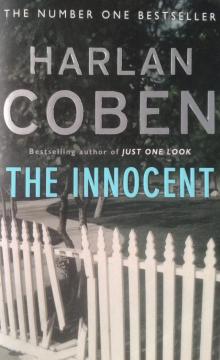 The Innocent
The Innocent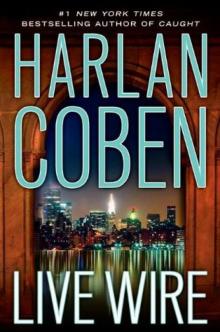 Live Wire
Live Wire Play Dead
Play Dead Drop Shot
Drop Shot Seconds Away
Seconds Away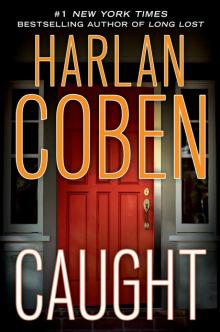 Caught
Caught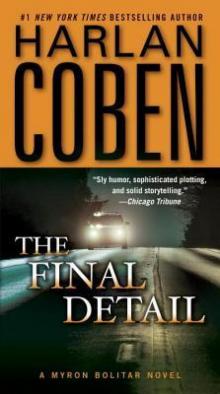 The Final Detail
The Final Detail Fade Away
Fade Away Home
Home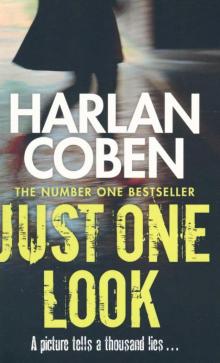 Just One Look
Just One Look Hold Tight
Hold Tight Fool Me Once
Fool Me Once Tell No One
Tell No One No Second Chance
No Second Chance Deal Breaker
Deal Breaker Long Lost
Long Lost One False Move
One False Move The Woods
The Woods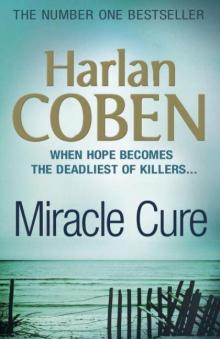 Miracle Cure
Miracle Cure Found
Found Don't Let Go
Don't Let Go Darkest Fear
Darkest Fear The Stranger
The Stranger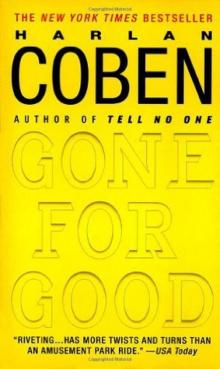 Gone for Good
Gone for Good Back Spin
Back Spin Shelter
Shelter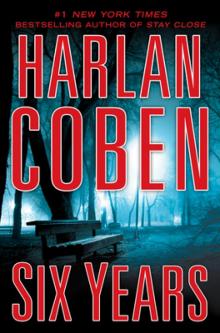 Six Years
Six Years The Boy from the Woods
The Boy from the Woods Missing You
Missing You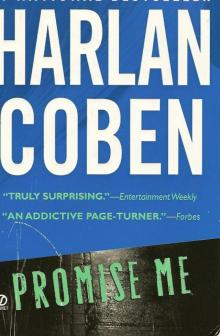 Promise Me mb-8
Promise Me mb-8 The Final Detail: A Myron Bolitar Novel
The Final Detail: A Myron Bolitar Novel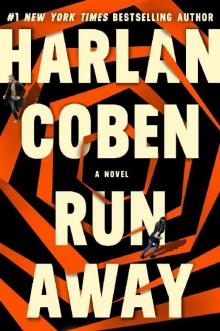 Run Away
Run Away One False Move: A Myron Bolitar Novel
One False Move: A Myron Bolitar Novel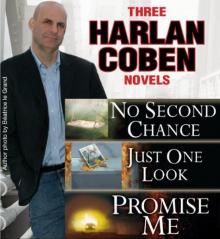 Three Harlan Coben Novels
Three Harlan Coben Novels the Woods (2007)
the Woods (2007) Tell No One (2001)
Tell No One (2001) the Innocent (2005)
the Innocent (2005) The Myron Bolitar Series 7-Book Bundle
The Myron Bolitar Series 7-Book Bundle Gone for Good (2002)
Gone for Good (2002) Caught (2010)
Caught (2010) Hold Tight (2008)
Hold Tight (2008)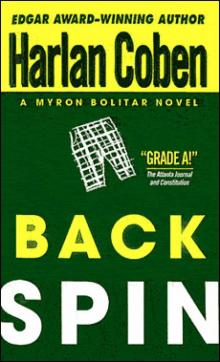 04 - Back Spin
04 - Back Spin Miracle Cure (1991)
Miracle Cure (1991) Harlan Coben 3 Novel Collection
Harlan Coben 3 Novel Collection Just One Look (2004)
Just One Look (2004) The Final Detail mb-6
The Final Detail mb-6 Play Dead (2010)
Play Dead (2010)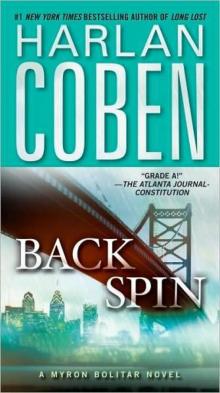 Back Spin mb-4
Back Spin mb-4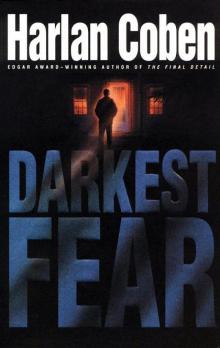 Darkest Fear mb-7
Darkest Fear mb-7